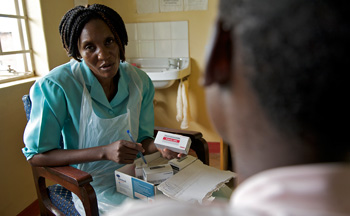Sexually transmitted infections significantly facilitate both HIV acquisition and transmission and are among the major causes of illness. A person with sexually transmitted infection (STI) has a much higher risk of acquiring HIV from an infected partner and a person infected with both HIV and another STI has much greater risk of transmitting HIV to an uninfected partner. The risk of sexually transmitting HIV may be increased 5 to 10 times in the presence of an STI.Controlling sexually transmitted infections is therefore critical in reducing HIV transmission. Proper management of sexually transmitted infections is one of the major HIV prevention strategies. However, for some years, HIV management has overshadowed the importance of providing quality STI services in Malawi. Much effort has been concentrated into the prevention and control of HIV/AIDS, neglecting other STI’s that also facilitate transmission of the former.
Gaps
- Poor quality STI services
- STI treatment coverage at 41%
- Low HIV testing rates in STI clinics (49%)
- Significant number of STI patients access private sector facilities
- Adherence to national treatment guidelines questionable
- No reporting to national program
Goals, Objectives
- Improve quality STI services
- Increase STI treatment coverage
- Increase HIV testing in STI clinic
- Improved reporting from private sector facilities
Outcomes
- Improved quality of STI services
- Increased coverage of STI treatment from 41% to 85% by 2019
- Increased HIV testing in STI clinic from 49% to 75% by 2019
- 75% of private sector facilities reporting STI cases treated to the national program by 2019
Challenges and lessons learnt
- STI program was dormant for a long time
- Very limited activities were implemented in the past 6 years due to lack of funding
- Most STI cases not managed according to National guidelines
Plans to address the gaps
- Training and mentoring in STI guidelines
- Intensify STI supportive supervision
- Integrate HIV testing into STI services
- Quarterly quality assurance meetings with district management teams and private sector
- Conduct STI sentinel surveillance
